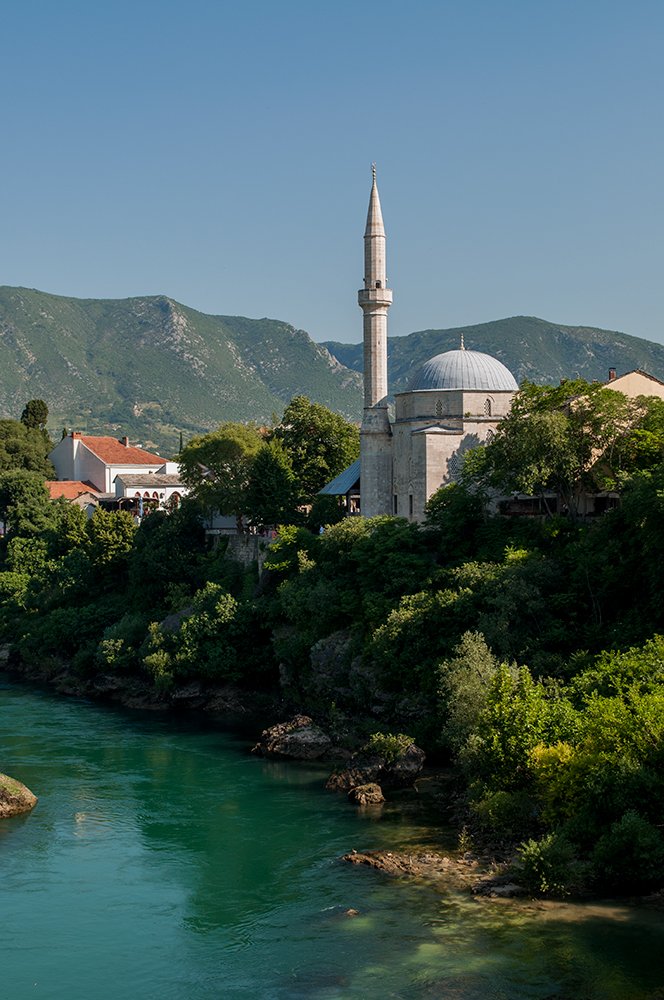
GREEN ISLAM
Author: Prof. Dževad Hodžić, PhD, Faculty of Islamic Studies of University of Sarajevo • Illustration: Koski Mehmed-pasha mosque in Mostar, 17th century • Photo: Kenan Šurković i Elvira Bojadžić

At one point in his West-Eastern Diwan (West-Ostliche Divan) Goethe alludes to the 26th verse (aya) of the Qur'an chapter Baqara: “Should I not use an example as I wish, the same as God gives us an example of life by mentioning a mosquito?” (Schimmel, 2003). It is just one of the many Qur'an verses (ayat) which outline the Islamic metaphysical horizon for the ethical status of Nature and animals in the Muslim religious, anthropological and cultural universe. This metaphysical horizon, where Bosnian Muslims, among others, encounter Nature and living beings in their moral, aesthetic, architectural and cultural tradition, is based on the Islamic doctrine of unity (tawhid). Nature as a whole and all the living beings in it are theophanies of a scary (mysterium tremendum) and fascinating secret (mysterium fascinans), i.e. of God's names of power (ism al-jalal) and God's names of beauty (ism al-jamal).
There are many theological, philosophical, Sufi, literary and legal works in the Muslim intellectual tradition on the topic of friendly emotional and cognitive relations with animals, and their intrinsic spiritual and moral values. They include Attar's The Conference of the Birds, Qazwini's The Miracle of Creation, Razi's The Philosophical Approach, Brethren of Purity (Ihvanu as-safa) and their Case of the Animals versus Man and Ibn Tufail's philosophical novel Alive, son of Awake (Hayy ubn Yaqzan).
When God's Prophet says that the whole Earth is a place where one prays to God (masjid), it means that the whole Earth is clean, holy; or as the Muslim scholar Nasr points out, that forms of Nature are thus numerous “mosques” which conceal and reveal different features of God (Nasr, 2001).
According to Islamic tradition, the forever young Khidr lives in Nature. Khidr is a typical Islamic “environmentally friendly” personality, he is a green man, a man of Nature. Karić cites the opinion of the traditional hermeneutist of the Qur'an, Mudzahid, that whenever Khidr performed a prayer (salat), everything around him would turn green. In the same vein, in the Bosnian tradition of Islam, Khidr is known by the name Hrzul. It is believed that people can sometimes even meet this holy man, although they are typically not aware that it is him that they have met.
A great Bosniak writer, one of the greatest in the Bosnian-speaking region in the 20th century, Nedžad Ibrišimović, published the novel Vječnik, which is basically inspired by the metaphysical, cosmic, historical and holy-historical dimensions of Khidr, the forever young, green man. The significant poetic opus of the Bosniak poet Asmir Kujović includes a poem entitled “Khidr”.
Educated and raised in the spirit of the Islamic definition of Nature and based on their religious convictions, Bosnian Muslims have traditionally believed that all God's creatures have their rights, which God presented to them, and that these rights should be respected. As early as in the 18th century, Mustafa, a son of Muhamed from Prusac, wrote an ecological and bioethical treatise entitled “Treatise on Compassion and Mercy for all Living Creatures“. The manuscript has been translated into Bosnian under the title “Etika milosrđa ili Traktat o samilosti i sažaljenju spram živih stvorenja” (The Ethics of Compassion or Treatise on the Compassion and Mercy for All Living Creatures) (Šukrić, 1987).
Respecting Islamic environmental and bioethical norms, many traditional Muslims in Bosnia, for example, never wanted to cut a green branch of a tree for heating. When a fruit tree had to be cut down for some justified reason, it was always done in late autumn or in winter, when it had no leaves and was not green. Based on the Prophet's famous tradition (hadith) that he will value as compassion every instance when a Muslim plants a tree or sows seeds that will be eaten by birds, people or any animal, people in the Bosnian culture of Islam have for centuries voluntarily grafted/trimmed fruit trees, both on their property and in public spaces, convinced that in this way they are doing a great hajr (godly deed). In his studies of Muslim folk heroic poems, Kosta Herman recorded that the famous Muslim hero Alija Đerzelez is said to have never cut a green branch off a tree.
Muslim architecture in Bosnia has also developed in a friendly relationship with the natural environment. Urban neighborhoods lived in close and friendly relations with their natural surroundings, with a lot of greenery, water, gardens, and rose gardens. Prayers have been performed in Bosnia in the open air in natural environments, so-called dovištes (pilgrimage sites), for centuries. Mosques are full of light. In mosque courtyards, fountains (shadirvans) spread the water’s words of prayer, flowers spread fragrance and nišans (tombstones) shine white. Bosnian Muslims have traditionally built their places of worship (mosques) not on high elevations but in lowlands. In fact, mosques do not seek to rise above the Bosnian hills and elevations, they are humbly integrated into nature, as if they themselves were bowing in prostration (sedžda), meek before the Lord of all worlds and before nature, the magnificent product of His creation.
In Bosnian tradition Islam is a natural religion, green in color and cheerful in life.
Sources:
Annemarie Schimmel, Islam and the Wonders of Creation: The Animal Kindom, Al-Furqan Islamic Heritage Foundation, Publications: No. 81, Al-Furqan Lecture Series: No.5, London, 1. septembar, 2003.
Seyyed Hossein Nasr, Susret čovjeka i prirode, duhovna kriza modernog čovjeka, prijevod i pogovor Enes Karić, El-Kalem, Sarajevo, 2001.
Zbornik radova Islamskog teološkog fakulteta u Sarajevu, 2, 1987.
Narodne pjesme muslimana u BiH, sabrao Kosta Hermann 1888-1889, Svjetlost Sarajevo, 1976.
